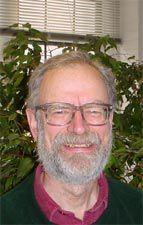Andrew Casson
Philip Schuyler Beebe Professor of Mathematics
 Andrew Casson, B.A. and research fellow at Trinity College, Cambridge University, faculty member at Yale since 2000: You are a world leader in geometric topology, a mathematician who has made prize-winning and influential mathematical discoveries. Your accomplishments are not easy for non-mathematicians to comprehend, but everyone can understand when we say that your work has been transformative and has always been known for its clarity and exacting precision. Your quiet demeanor and reluctance to claim too much have always left your colleagues wondering what you were going to come up with next—but it was always noteworthy. You have had a knack for introducing new structures which fundamentally change mathematicians’ point of view on the subject: the mark of a fine mathematician and an original mind.
Andrew Casson, B.A. and research fellow at Trinity College, Cambridge University, faculty member at Yale since 2000: You are a world leader in geometric topology, a mathematician who has made prize-winning and influential mathematical discoveries. Your accomplishments are not easy for non-mathematicians to comprehend, but everyone can understand when we say that your work has been transformative and has always been known for its clarity and exacting precision. Your quiet demeanor and reluctance to claim too much have always left your colleagues wondering what you were going to come up with next—but it was always noteworthy. You have had a knack for introducing new structures which fundamentally change mathematicians’ point of view on the subject: the mark of a fine mathematician and an original mind.
In the realm of dimension 5 and above, you contributed to the central classification theory and the disproof of what topologists call the Hauptvermutung (main conjecture), relating the different structures—continuous, piecewise-linear, and smooth—which a manifold can have. Your influence broadened as the dimension of the spaces you considered came downward. In dimension 4 you developed what we know as “Casson handles” with which you constructed exotic smooth 4-manifolds, and which played an important role in the solution of the 4-dimensional Poincaré conjecture. You continued into 3 dimensions, where you contributed to the development of the classification theory of 3-manifolds in the 1970s, ’80s, and ’90s, introducing the “Casson invariant,” finding a solution to the Seifert conjecture, and developing a structure theory for the study of Heegaard splittings.
As testimony to your category-changing discoveries, you were awarded the Veblen Prize in Geometry in 1991 and made a Fellow of the Royal Society in 1998, both well-deserved recognitions of your deep contributions.
At Yale you have been the most exemplary of citizens: Your crystal-clear lectures to both graduates and undergraduates on the most complex subjects are legendary. In 2012 Yale College awarded you the esteemed Dylan Hixon Teaching Prize in recognition of exactly this. Your dedication to the institution, and to the craft of teaching, and your willingness to shoulder the burden of DUS for far longer than your departmental tradition requires have been a boon to the department and a humbling precedent.
Your colleagues are deeply grateful for your contributions, first to mathematics, and next to the department itself. Generations of younger mathematicians owe their greater understanding of the discipline and their own commitment to mathematics to your guidance and generosity. Although you are retiring, Yale’s Mathematics department is unwilling to give you up: we look forward to your participation in department seminars and to your perspective and understated wisdom for years to come.